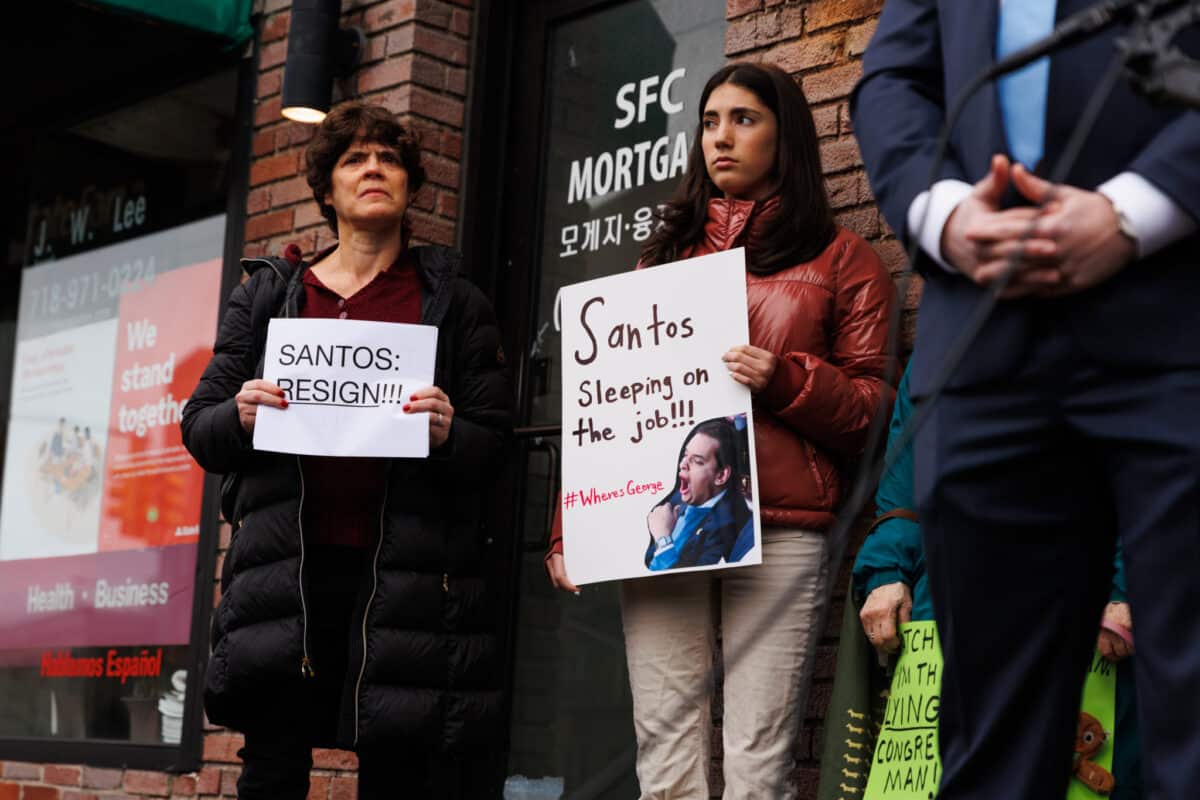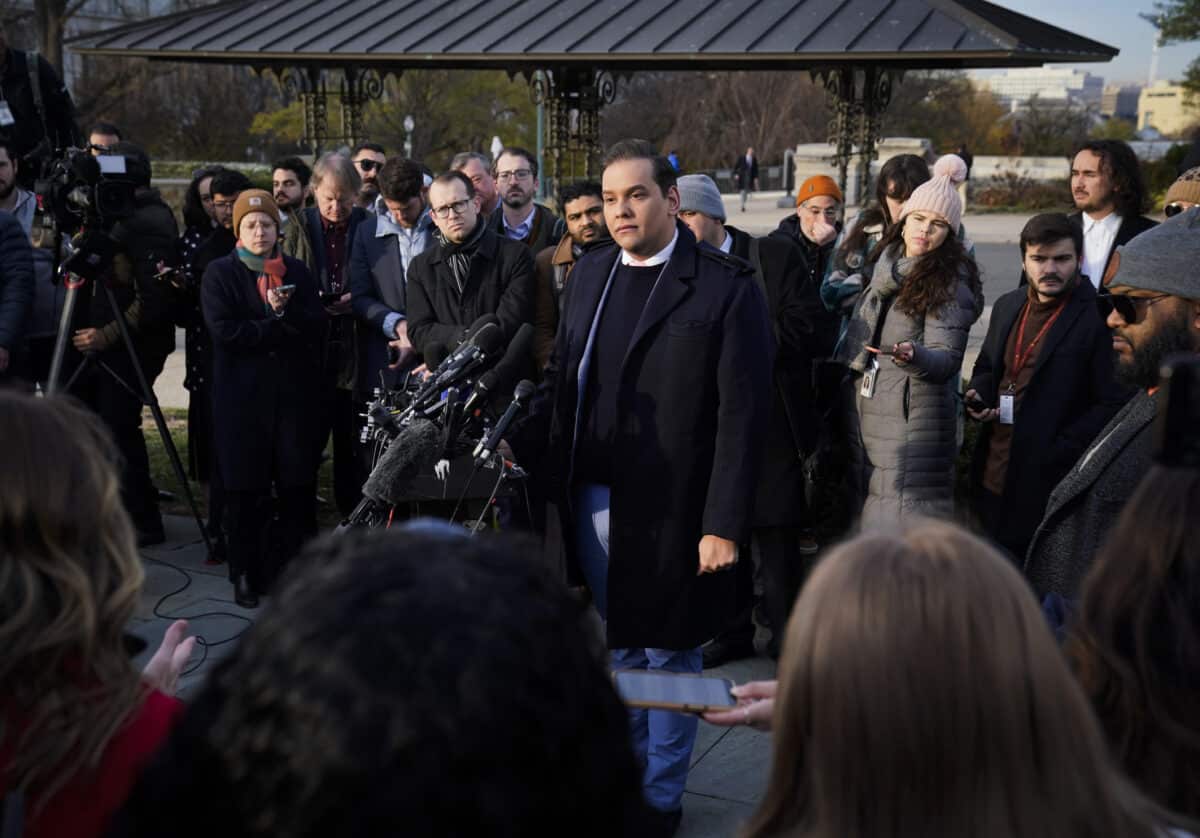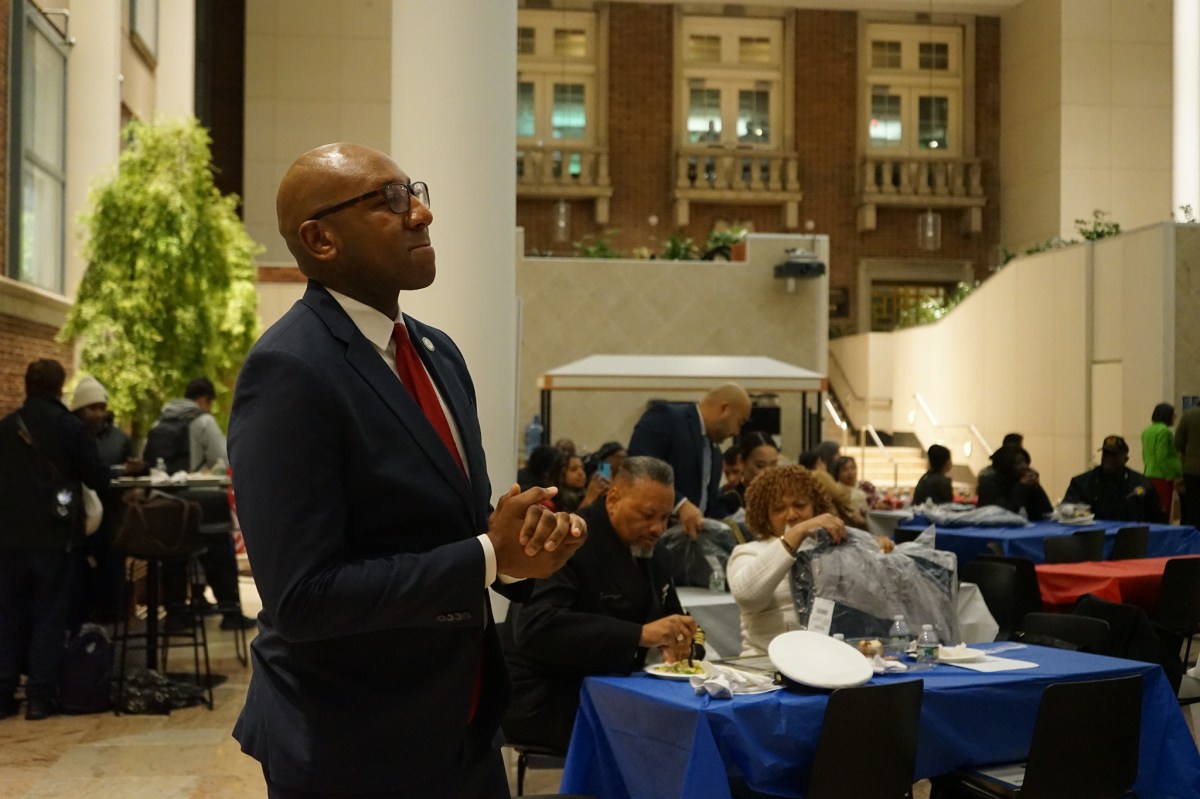George Santos, we hardly knew ye.
After a turbulent 11 months in office, Santos was unceremoniously expelled from the House of Representatives Friday — a rare moment of overwhelming bipartisanship that reflected the gravity of the fraud allegations against the man elected in 2022 to represent the 3rd District covering northeast Queens and northern Nassau County.
From the start, Santos’ term was tainted by revelations in a New York Times exposé in December 2022 which found that he had extensively lied about his background on the campaign trail. The report alleged the Republican lied about almost everything — where he went to school, where he worked, his personal fortune, even his faith.
But that was only the tip of the iceberg. During his 11 months on Capitol Hill, Santos would be indicted not once, but twice on federal fraud charges after investigations found he had bilked thousands of dollars in campaign funds, and submitted fraudulent documents to both Congress and the national Republican Party regarding his personal fortune in order to receive more financial backing.
A House Ethics Committee only served to reinforce those federal indictments, which Santos slandered with the Trumpian vernacular as “witch hunt.”
And yet, over 11 months, Santos managed to outlast public shaming, calls for his resignation from even his Republican colleagues, two lengthy speaker votes and two failed expulsion votes before the House showed him the door.
The expulsion effort itself was extraordinary because it marked the first time a sitting House member had been ousted without previously being convicted of a felony, setting what some have deemed a concerning precedent.
But Santos’ occupancy of New York’s 3rd District seat was itself without precedent, given the magnitude of falsehoods that paved his way to Washington.
September 2022
Like many undoings of elected officials caught in scandal, the unraveling of George Santos began with a local newspaper article — though few turned out to have noticed when it first came out.
The North Shore Leader, a paper covering areas of northern Nassau County, reported in September 2022 that Santos had filed a Personal Financial Disclosure Report claiming his personal wealth at $11 million. Reporter Maureen Daly described it as an “inexplicable rise,” because in filings from his 2020 campaign, he reported “no assets over $5,000” and “a net worth barely above zero.”
That September 2022 report would later come back to bite both Santos and his campaign treasurer, Nancy Marks. But the North Shore Leader report did not make any immediate impact on the campaign between Santos and Democratic nominee Robert Zimmerman in the contest to fill the 3rd District seat occupied by the outgoing Tom Suozzi, who had previously made a failed bid to become governor.
On the campaign trail, Santos styled himself as a typical Republican candidate of the times. His campaign website featured a bio in which he railed about “out-of-control” inflation and “rampant” crime in the streets, and claiming that “New Yorkers have watched their communities suffer due to the failed policies pushed by extreme Democrat rule in Washington and Albany.”
Nov. 8, 2022

Santos was swept into office on Election Day, powered by a “red wave” of Republican voters on Long Island who put all four Nassau and Suffolk County’s Congressional seats into the GOP column. The outcome was not unexpected, given that Republicans tend to do well in midterm elections when a Democrat is in the White House, and a court-drawn redistricting plan proved more favorable for Republicans than Democrats would have liked.
Dec. 19, 2022
What wasn’t expected, however, was The New York Times profile in December on Santos that accused him of lying about almost every aspect of his life.
Santos had claimed he worked for Citigroup and Goldman Sachs. Both financial giants denied he was ever employed there.
Santos had claimed he attended NYU and Baruch College. Both educational institutions denied he was ever enrolled.
Santos had claimed to have founded a nonprofit animal rescue organization called Friends of Pets United. The Times reported there were no records of the charity having existed.
Even Santos’ claim that he was Jewish and descended from Holocaust survivors turned out to be embellished. Santos refuted that he ever claimed to be Jewish, telling the New York Post that he was Catholic, and “Because I learned my maternal family had a Jewish background, I said I was ‘Jew-ish.'”
The whoppers drew comparisons between Santos and George Costanza, the notorious liar from the classic sitcom Seinfeld. But the Santos situation was no laughing matter.
Jan. 3-7, 2023
Santos was to have been sworn into office on Jan. 3, 2023 along with the other 434 elected House members, but that inauguration was delayed by the marathon election of Kevin McCarthy as speaker. After 15 votes in a fractious Republican House caucus, McCarthy finally won the post early on the morning of Jan. 7; Santos had voted for McCarthy all 15 times.
Jan. 11
After the Times expose came out and Santos admitted to falsifying his background in part, he quickly lost the support of Republicans in his home district. Nassau County Executive Bruce Blakeman and the Nassau County GOP publicly called for Santos to step aside. Days later, groups of voters in the 3rd District protest outside Santos’ office in Douglaston demanding his ouster, the first of many such demonstrations throughout the year.
But Santos remained defiant.
“I was elected to serve the people of #NY03 not the party & politicians,” Santos tweeted. “I remain committed to doing that and regret to hear that local officials refuse to work with my office to deliver results to keep our community safe and lower the cost of living. I will NOT resign!”
Feb. 7
Santos evoked the ire of Utah Senator Mitt Romney during President Joe Biden’s State of the Union Address in February. Romney chided Santos for attempting to shake hands with the president and flatly told Santos, “You don’t belong here.”
Taking the low road, Santos fired back at Romney on Twitter, reminding him of his 2012 presidential election loss to Barack Obama.
Feb. 23

Perhaps in an effort to anger liberals, Santos co-sponsors legislation to make the AR-15 — the weapon of choice for numerous mass shooters in recent years — the national gun of the United States. It is one of many far-right bills Santos signs on to during his short tenure on Capitol Hill.
Other far-right legislation which he either introduced or publicly supported includes bills requiring the president to undergo an annual cognitive examination; restricting the federal government’s ability to mandate vaccines; barring social media companies from deplatforming anyone; banning transgender athletes from competing in athletic competitions based on their own identity, euphemistically referred to as the “Protection of Women & Girls in Sports Act”; and preventing the federal government from regulating elections.
April 4

Donald Trump, the Republican former president, was indicted in April in New York for an alleged hush money scheme to cover up a reported extramarital affair. Three more indictments would follow within months, with Trump being accused of illegally hoarding classified documents at his Mar-a-Lago home in Florida, provoking the Jan. 6, 2021 insurrection by his supporters on Capitol Hill, and engaging in a vast conspiracy in Georgia to illegally overturn the election results there in 2020.
When Trump appeared in a Manhattan court in April for the first indictment, George Santos made his way over there to capture some of the limelight for himself, along with another right-wing firebrand, Georgia Congress Member Marjorie Taylor-Greene.
The rally outside Trump’s arraignment hearing turned out to be a bust for Santos and Greene, who fled when confronted by counter-protesters and the press. But in a month’s time, Santos himself would find himself facing his own legal troubles.
May 10
Santos was hit with a 13-count federal indictment charging him with fraud, money laundering, theft of public funds, and lying to the House of Representatives. He’s accused of defrauding the state Labor Department to receive unemployment benefits; siphoning off campaign contributions to his personal bank accounts for his own profit; and grossly exaggerating his personal wealth in campaign finance forms presented to Congress.
After securing release on $500,000 bond, Santos denounced the indictment as a “witch hunt” in speaking to reporters outside the federal courthouse in Central Islip.
“This is the beginning of the ability for me to address and defend myself,” Santos told reporters during the media circus. “I’m gonna fight my battle, I’m gonna deliver, I’m gonna fight the witch hunt, I’m gonna take care of clearing my name. And I look forward to doing that.”
May 17
Santos survived the first attempt by House members to expel him from his seat in an effort largely backed by Democrats. The Republican House majority derails the effort. The House Ethics Committee’s investigation continued.
May 31
Santos voted against the Fiscal Responsibility Act, which passed Congress anyway. The legislation raised the debt ceiling and averted the country’s first ever default.
June 6
Questions are raised as to who funded Santos’ $500,000 bond. In a court briefing, the embattled Congressman’s attorney says Santos would rather go to jail than disclosed the individuals who put up his bail. Days later, a judge ruled that Santos had to make the disclosure. It turned out that his aunt and father co-signed the bail certificate.
Oct. 3
Days after a vote that averted a government shutdown, some of Santos’ far-right colleagues introduced a motion to vacate the chair — effectively seeking to remove Kevin McCarthy as speaker. Eight Republicans joined 212 Democrats in voting to vacate the chair, making McCarthy the first speaker ever to lose his post in the middle of a Congressional session. Santos, who had supported McCarthy as speaker in January, voted against the vacate motion. The House entered its second fractious speaker election, paralyzing Congress for the next three weeks while the Republican majority looked to find a new leader.
Oct. 5
Nancy Marks, who served as Santos’ campaign treasurer for his 2022 campaign, pleaded guilty to a federal felony charge. In the courtroom after entering the guilty plea, Marks read a written statement admitting to filing false numbers with the Federal Election Commission for Santos’s campaign — one of which included a $500,000 donation from Santos himself — in order to meet certain benchmarks for national party approval from the Republican Party.
Marks’ guilty plea was a sign of things to come for Santos.
Oct. 10

Santos was indicted for a second time in federal court. The second indictment accuses the Congress member of “stealing people’s identities and making charges on his own donors’ credit cards without their authorization,” according to U.S. Attorney of the Eastern District of New York Breon Peace. He is further accuse of submitting fraudulent financial records to the national Republican Party in order to obtain campaign cash.
Santos pleaded not guilty to the second indictment weeks later in Central Islip federal court. If convicted, he faces up to 20 years behind bars.
That same day, Tom Suozzi, who previously held the 3rd District seat, formally announced his campaign to win the seat back next November. At that point, more than a dozen Democrats and Republicans had thrown their hats into the ring.
Oct. 25
For the second time in his brief term, Santos helped to elect a new speaker of the House. Santos joined the entire Republican majority in giving the gavel to right-wing Louisiana Congress Member Mike Johnson. Santos, who is gay, publicly congratulated Johnson, who is strongly opposed to LGBTQ+ rights, including marriage equality. Johnson is also one of 147 Republicans who voted to overturn the 2020 presidential election results immediately after the Jan. 6, 2021 insurrection by Trump supporters on the U.S. Capitol.
Nov. 1
Yet again, Santos survived an expulsion attempt, this time raised by two of his Long Island colleagues — Republican Congress Members Anthony D’Esposito and Nick LaLota. The gambit fails as many House members balk at the concept of expelling a House member who has yet to be convicted of a crime, an unprecedented step. Others take a wait-and-see approach, as the House Ethics Committee had yet to release the findings of its investigation into Santos. The vote falls far short of the two-thirds majority needed for a member to be expelled.
Nov. 16
More than a year after his election, the beginning of Santos’ end dawns. The House Ethics Committee released its findings of its inquiry, which not only seemed to verify the criminal charges against Santos, but also that the Congress member allegedly used campaign proceeds for personal expenses from Botox to OnlyFans subscriptions. Santos yet again rebuffed calls to immediately resign, though he did announce that he will not seek re-election in 2024.
Nov. 28

Dueling resolutions to expel Santos were introduced by Democratic and Republican House members. The Republican resolution, backed by D’Esposito, is put on a fast track for a House vote, eventually scheduled for Dec. 1.
Nov. 29-30
Despite expressing “real reservations” about the expulsion vote, Speaker Johnson ultimately told his Republican colleagues to “vote their conscience” on Santos’ fate. Democrats in the House who opposed the previous expulsion measure voiced their support for the new vote. Santos remained defiant to the end, refusing to resign, and threatening to expose other corruption on Capitol Hill.
Dec. 1
George Santos, representative of the 3rd District of New York, becomes the sixth Member of Congress in 234 years to be expelled from the House of Representatives. More than 300 members, including over 100 Republicans, supported his ouster, well above the two-thirds majority required for expulsion. Governor Kathy Hochul announced she will soon fill the seat via special election, which will take place within the next three months.
Read more: FDNY Budget Cuts Spark Outrage from Firefighters Union




































